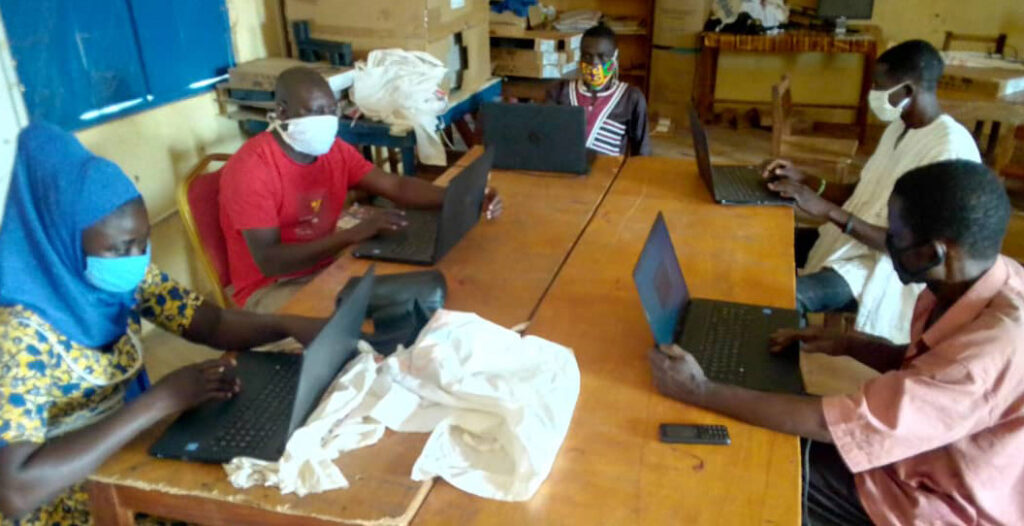
Fortuitously the Northern Region of Ghana has had few reported cases of COVID-19; Executive Director Emerita Alice Iddi-Gubbels and Program Director Baba Bukari are happy to report that the La’Angum Learning Center (LLC) and PAMBE Ghana family are currently healthy. Strict orders from the Ghanaian government required all schools including LLC to suspend in-class learning in March. Recently, the Ghanaian Education Service phased in classroom openings for older students, but this reopening did not extend to elementary schools. The abrupt school closure presented immediate challenges as LLC students live in several villages that in the main lack electricity and internet. The kind of home-based online learning implemented in parts of the United States – albeit with mixed results – is not possible at all in this region. Stressed children and their parents are eager for school to begin again.
Since March, PAMBE Ghana has continued to pay LLC teachers and staff, who have spent this time of closure furthering their own educations and designing a plan to engage with students in the four communities served by LLC. Teachers will travel to each village and meet with groups of 3-4 children at one time to review concepts and distribute worksheets. They expect to meet with 2-4 groups of children per day. Once all students have been reached, the teachers will begin the rotation again, reviewing worksheets, reinforcing and extending concepts and helping the students feel connected to school. In these visits, the teachers also will meet with parents to teach them about COVID-19 precautions and to ask parents to let their students engage with the visiting teachers. If permitted, future plans include allowing older and prior students to visit the LLC library and computer lab on an ad hoc basis.
Program Director Baba Bukari used his time this Spring to help LLC teachers gain computer literacy skills. In 2019, the Ghanaian Education Service announced a new curriculum with an emphasis on digital literacy, and the pandemic has created an immediate need to master and utilize these critical computer skills. The LLC teachers have met twice a week from March-July in the LLC computer lab with the school’s ICT (technology) teacher to improve their facility with and expand their skills on computers as well as smart phones. Teachers are now using these new skills to hold weekly virtual staff meetings from their various home villages – even though to connect they must go to a specific internet access location. Despite these advances, virtual classroom learning remains untenable as LLC students lack electrical power, suitable internet connections and devices at home, and data remain very expensive.
While distancing, handwashing and mask protocols are in place throughout the Northern Region, much of the local economy is informal and depends heavily on social interaction. Thus, work such as gathering and selling firewood or bringing crops to market still continues. The president of Ghana has shown strong leadership and broadcasts weekly addresses to the nation to inform the population about COVID-19.
by Pat Yonka
An example of generosity: Two of La’Angum’s students from the elementary level came to Langbinsi bearing gifts: pigeons. Alice looked inside the bag and then gave the boys directions in Mampruli. After they left she explained that the pigeons were alive and her instructions to the boys were to return after they had killed, gutted, and de-feathered these unfortunate birds. Had I seen them I probably would have become attached and, thus, unable to eat!
 During our first workshop with the elementary level teachers I explained my reconstruction of the classroom in which we met. Instead of rows of tables with benches, all facing the front of the room, I organized the tables into configurations that encouraged work groups but allowed for open floor space for materials presentations as well as individual and group work. The benches were placed around the perimeter of the room. The Montessori materials were arranged on open shelves, all of which had been thoroughly cleaned prior to the workshop. During our first workshop with the elementary level teachers I explained my reconstruction of the classroom in which we met. Instead of rows of tables with benches, all facing the front of the room, I organized the tables into configurations that encouraged work groups but allowed for open floor space for materials presentations as well as individual and group work. The benches were placed around the perimeter of the room. The Montessori materials were arranged on open shelves, all of which had been thoroughly cleaned prior to the workshop.
The workshop began with a comparison of Montessori education to traditional education. As most La”Angum teachers, college-educated, had experienced and replicated traditional methods – teacher at the front of a class with a pointer and a chalk board and students seated on benches at long tables, facing the teacher, my request that they gather on a rug on the floor with me was a bit of a surprise. Some chose to sit at a table but most joined me on the rug.
Then I discussed some of the key points of the Montessori approach to education: child-centered (Montessori’s charge to “follow the child” ), classes organized in age groups- 3 to 6, 6 to 9, and 9 to 12, “freedom within limits”- children may choose work that reflects their interests but must show respect for the materials (exhibited by the care each child demonstrates when using them) and for each other and their teachers, and the dictum that 10% of what a student hears is remembered while 90% of what a student does is learned!
by Pat Yonka
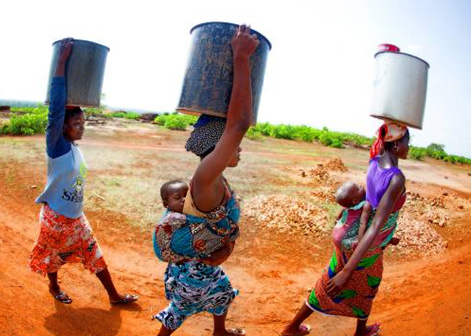 A Visit to Alice’s mother at her compound: I was greeted by her mother and many relatives, an occasion of much joy and laughter, especially when I attempted to carry an empty bucket on my head as is the custom for women and children. Even when I made a nest for the bucket using my bandana, I could barely keep it on my head. Alice said it is because I have “slippery hair.” A Visit to Alice’s mother at her compound: I was greeted by her mother and many relatives, an occasion of much joy and laughter, especially when I attempted to carry an empty bucket on my head as is the custom for women and children. Even when I made a nest for the bucket using my bandana, I could barely keep it on my head. Alice said it is because I have “slippery hair.”
Later I joined a group of women from Bongbini as they plastered the floor of a new hut. As one woman pours water on the floor the others, using large wood mallets, pound and sing until the surface is smooth.
On our walk home that evening I suggested that we cut through the village. Alice replied that, even though we had visited the people whose huts and compounds we were passing, we would be expected to stop and go through the greeting process again. So we took the long route!
Back in Langbinsi I struggled with our Internet connection, hoping to get another letter off. Before long there was a powerful “braying” of a nearby donkey, so loud I thought he had to be right outside our door, and this was at 10 p.m.! Alice wryly replied that it …”is mating season and maybe the ‘braying’ is more than just braying!”
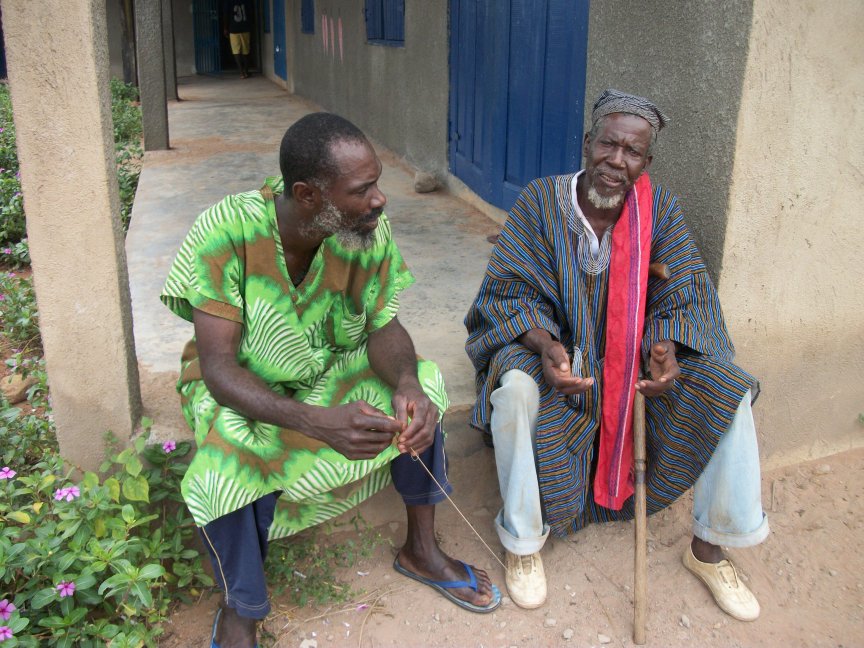
by Pat Yonka
Customs of the country: During our visit to Bumboazio I learned many people were attending the funeral celebration of the head chief of an adjacent village. Widows wear white during this year of mourning and a year after an individual has died there are celebrations. Alice and I met the Imam and several other elders of the village as well as the head chief’s four wives to whom we conveyed our condolences.
Children were everywhere and eager to greet the “sululminja,” the white person. The youngest children, struck by the difference in skin tone, were frightened and some cried. I moved away, hoping to diminish their fear.
Many parents and others expressed a desire to learn to read and write English (the official language of Ghana). I felt a consistent desire on the part of these individuals to become literate.
During the final visit of the day we talked with a family shelling ground nuts (delicious!). We were invited inside their hut to talk with the eldest son who was visiting and spoke English. He talked of the importance of family to his people and how many people in the United States seem separated from their families, making close relationships more difficult. His elderly mother was present as were other members of his family. He was saddened by the appearance of a loss of community in countries where the elderly were put in nursing homes and people spent more time in private homes than in public meeting places.
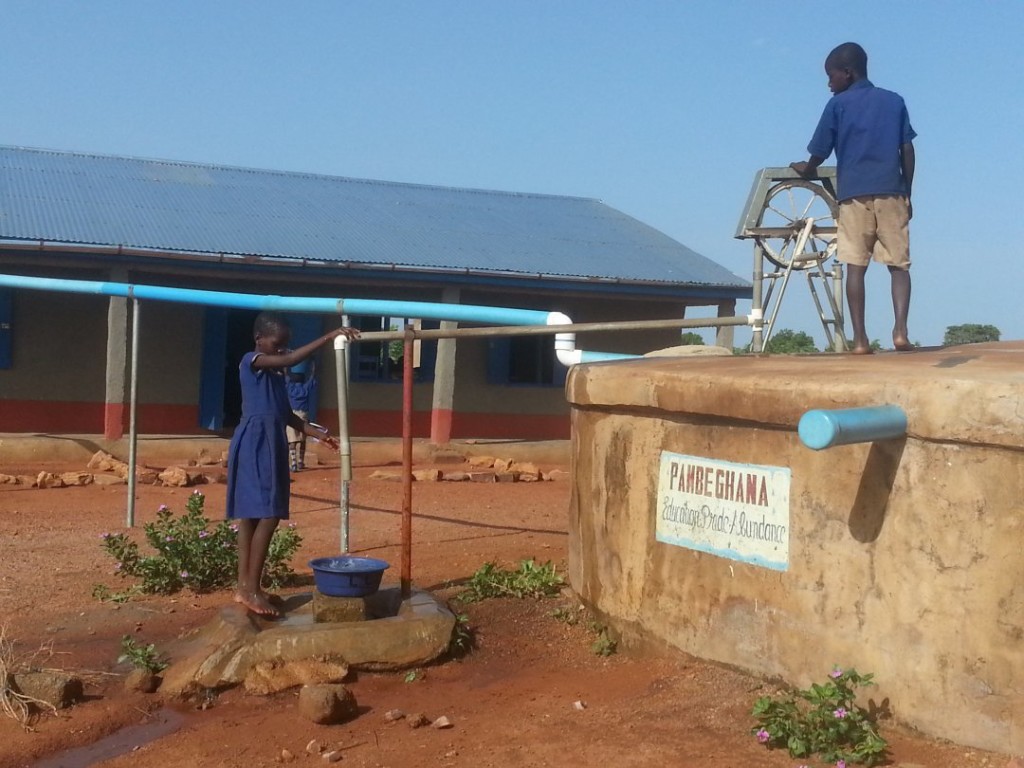 by Pat Yonka by Pat Yonka
The school buildings have been carefully designed and laid out, using the direction of the sun advantageously. The porches that surround the two main buildings provide shade and a place for gathering-very different from schools in the US that utilize indoor hallways to deal with cold. There is a Gazebo, one of the first structures of the school that provides an excellent space for outdoor classes.
Water is always an issue as the school has no running water and must rely on large tanks that catch water though a series of pipes on the roofs of the school buildings. These tanks are full during the rainy season but often run dry before the next rains.
There are two lavatory facilities, one for urinating and another section with four latrines with doors, a luxury for many of the children who are accustomed to using brush areas. A nearby hand washing station provides soap and water for washing up after using one of the facilities.
On this, my second day at the school, I drew floor plans of each classroom and began an inventory of the learning materials in each classroom. As there are seven classrooms this occupied the better part of two days. The next task is to clean, inventory, and organize the storeroom.
On Friday Alice suggested we walk to Bumboazio to meet members of the community. As we walked to the village we greeted children on their way to school, many of whom were carrying water for their classrooms.
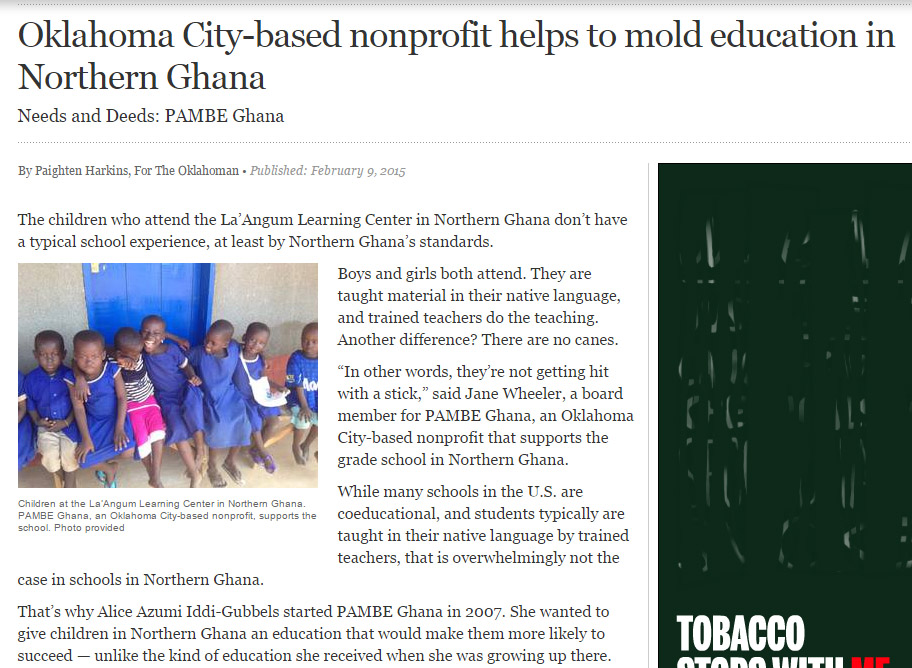 The Oklahoman
The Oklahoman published a feature item Monday, February 9, 2015 on PAMBE Ghana and its efforts to support education in Northern Ghana, through the La"Angum Learning Center.
http://newsok.com/oklahoma-city-based-nonprofit-helps-to-mold-education-in-northern-ghana/article/5391392
Field Notes*
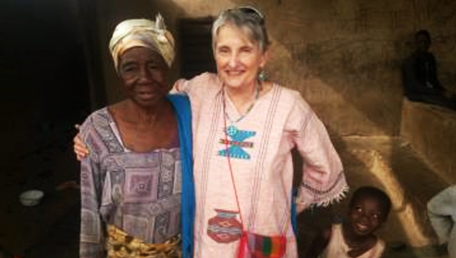 *Pat Yonka , a credentialed Montessori elementary teacher from Michigan, is working with elementary teachers at La’Angum school. This is the first of many “reports from Ghana.” *Pat Yonka , a credentialed Montessori elementary teacher from Michigan, is working with elementary teachers at La’Angum school. This is the first of many “reports from Ghana.”
January 2015:
Alice and Pat are residing in a guesthouse in Langbinsi to be closer to La’Angum School. As she describes it, “We are closer to the school but the road is not really a road, it is more like a ditch with rock formations over which we must travel- Mumprusi people do not need thrill rides – the roads provide more than anyone needs!
On Wednesday January 7 we held our first meeting with the La’Angum staff at our lodgings.
Each member of the staff contributed money, cooking labor, and expertise to provide a meal of guinea fowl, rice and sauce, and soft drinks. I am deeply, deeply humbled by the fact that people who have so very little are so willing to share so very much - this staff is a community that is open and loving, truly they are something to behold!
After the meal each person outlined his or her responsibilities at La’Angum, including information about each of the classes. It was a productive meeting and set a positive tone for further interactions.
On Thursday we were able to greet the children, deliver water filtration materials [a separate and amazing story in itself], and observe as teachers and students prepared their classrooms for Monday. I drew a floor plan and have started an inventory of Montessori materials present in each classroom. Tomorrow I inventory learning materials in Grades 3,4,5 and then start to clean and organize the supply room and continue to inventory materials. I am also rating the materials I see according to a 1 -2 -3 system: 1 meaning good condition; 2 meaning so-so condition; and, 3 meaning get a new one!
Our first major work time will be Saturday, January 17th from 9 until 2:30. Each classroom will have specific needs that I will address. The La’Angum teachers and staff are open and eager to learn.
|
Donate Today
Your Donation Today Will Help PAMBE Ghana Provide:
-- Teacher's salary
-- Children’s health insurance
-- Montessori materials
-- Teacher education
PAMBE Ghana is a 501(c)(3)
registered charitable organization.
|







